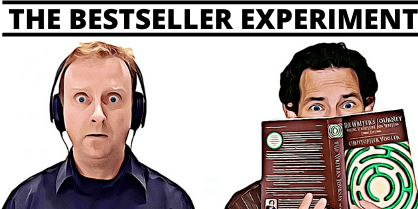EP02: Bestselling Editors | Sam Eades & Juliet Ewers – Orion Books
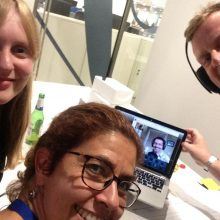
Ian Rankin, Neil Gaiman, Michael Connelly have worked with them and now they get us cornered. Juliet Ewers and Sam Eades are commissioning editors at the Orion Publishing Group. They explain just what an editor does, the common mistakes that writers make, and give us a big slap of a reality-check.
PODCAST
Click to Tweet: Editors @SamEades @JulietEwers tell you how (and how not) to write a bestseller #amwriting @bestsellerxp
Thanks for listening and joining us. Have some feedback you’d like to share? Leave a note in the comment section below.
SPREAD THE LOVE
If you enjoyed this episode, please share it using the social media buttons you see at the bottom of the post.
SUBSCRIBE, RATE & REVIEW ON ITUNES
Please do subscribe on iTunes and leave an honest review for The Bestseller Experiment Podcast on iTunes. Ratings and reviews are extremely helpful and greatly appreciated! They do matter in the rankings of the show, and we read each and every one of them. Don’t forget, when subscribing to the show on iTunes you will get automatic updates.
If you have any questions, you can contact us here.
Episode Highlights:
- Juliet Ewers – Commissioning Editor – Orion Publishing Group
- Sam Eades – Commissioning Editor – Trapeze Books
-
What does a commission editor do? It’s not just correcting your spelling!
-
What’s changed in publishing? And how you can make the most of these opportunities.
-
The most common mistakes by writers: And how you can avoid them.
-
Don’t cheat your reader: And how to have a longer career as a writer.
- Scrivener – Software for Writing
- Co-Hosts:
- Books Mentioned
Into The Woods – John Yorke
On Writing – Stephen King
Links featured in today’s show:
- Bestseller Experiment’s Vault of Gold. Sign up to get your free Writer’s ebook
- Question Mark: Have a question you want answered on the show? Click here.
EPISODE TRANSCRIPT (HIGHLIGHTS)
Juliet Ewers and Sam Eades are commissioning editors at the Orion Publishing Group in the UK. Juliet started her career 26 years ago and has worked with key authors such as Maeve Binchy and Ian Rankin.
Sam is a publicist-turned senior commissioning editor and has worked with Neil Gaiman, Jessie Burton and Michael Connelly.
This episode was pure gold with both Juliet and Sam bestowing so many nuggets of wisdom that we seriously ran over our usual running time.
We started with a simple question…
What does a commissioning editor do…?
Sam: We need to know who the audience is for a book, where it sits in the market, and what are the key selling points… things go wrong if you don’t know what those key selling points are.
You think you read books now, just wait till you become an editor… I’ve just had my three-hundreth submission.
But when there’s heat around a new book they have to pitch themselves to agents:
Sam: I once dismembered a doll and put it in a box and presented it to the agent to get a book. You have to do these crazy things to get these books. But hopefully you win and you get to take on that author and that’s when the fun begins…
The fun (or what does an editor do…?)
Sam: You send (the author) a set of editorial notes. Some of my notes have been two pages long, one of them was a thirty-five page document, and that’s a mix of line edits — picking up grammar mistakes, repetition of words — or it might be structural edits, so moving things around cutting chapters that don’t work, starting a book in a different place. That process is a conversation, the author might not agree with your changes, and you get to a point in the middle, and then you get the book. Alongside the editorial notes you’re briefing the cover, you’re writing the cover copy, we’re writing the bibliographic data for retailers, and our job as commissioning editor is to manage the process from manuscript to finished book and beyond… and there’s lots of Tweeting, too.
Sam: “There are two types of editors: plot & story, and voice. And I’m not voice, I’m definitely more plot and story. What I’m looking for is a message, a theme, a story that will resonate with lots of people.”
Juliet on what’s changed the most in her career as an editor:
The biggest change is the social media side – it just didn’t exist when I started – but then when I started at Orion we didn’t even have email. If you were lucky, your author had a fax machine! But basically the process is the same, you’re trying to find really good authors, talented people who you can help grow and develop their careers, whether you come up with an idea and find an author you think would be good for it, whether you’re getting submissions from agents and then following through from initial pitch to publication and beyond.
Ideally, a commissioning editor needs to be building careers, you need to be working hand-in-hand with an author and have a gorgeously long, profitable career for both of you. The author needs to be happy, so you’ve got to have a good relationship with them, and that has never changed. The agents need to be happy as well, because they’re not going to send you projects if they think you’re no good. The way we do things has changed, but the essence of it is pretty much the same: you’re trying to get the best books possible to the market.
On the most common mistakes made by writers:
Sam: They write a book by numbers, they look at what’s popular… a cynical attempt to write a bestseller where you see plot points in the story, but there’s no overarching narrative, there’s nothing that hangs it together… I think bestsellers work because they have something important they want to tell us, a bigger story. (The agent) Johnny Geller calls it the meaning in the space between words. The bad books don’t have any meaning in that space.
Juliet: Copying somebody else is never going to work. If you don’t love what you’re writing, how can you expect anyone else to love it? When Bridget Jones was new we had so many wannabe Bridget Jones and it was “Oh, that works, I’ll write that.”
In historical fiction; they’ve done lots of research and they’re jolly well going to put it in the book, regardless of whether it serves the story. That is so common and so annoying.
The biggest mistake authors make is thinking it’s easy. It really isn’t, so you have to be want to do it, you have to be dedicated, you have to love the genre you’re writing in, because it will show if you don’t.
A warning from Juliet: “If you’re cynically thinking “I’m going for a bestseller”, it’s really rare that you’ll actually make it, because people will see right through it.”
Learn from the best:
In crime writing, you can’t go wrong if you read Ian Rankin, read Stephen King’s “On Writing”. Learn from people who are doing it well, but don’t copy them and do your own thing.
It needs a great “What if?”
Juliet: If you’ve got something at the beginning that makes people start thinking and then want to spend time with your book, that’s going to help enormously, and an opening page that grabs them. If you lose them on the opening page, that’s it, you’re done.
Believable characters:
Juliet: They don’t have to be nice characters, but you have to believe in them and want to know what happens, why they’re doing this and whether they’re good or bad.
Don’t cheat your reader:
Juliet: It’s fine to have a coincidence at the beginning, or to set things up, don’t use a coincidence to solve it. Because if you cheat your read, yes they may have read the whole book, but they’re not going to come back for another one. which you may not care about if you’re only planning to write one, but generally authors want to have careers, and if you cheat your reader they will not forgive you. And write what you want to read. I think that’s really important, because if you want to read it the chances are somebody else will.
Juliet: “If you’re having fun, that will show in the writing. Go with it.
Enjoy it. Live it. Love it.”
On twists:
Sam: It’s fine to have a twist on the last page, as long as it impacts someone other than the reader. So another character has to realise something’s happened, something different. Because otherwise readers feel really cheated.
Ideas:
Sam: Look at popular films and think what’s the dark version of this story? Or if it’s a dark story, ask what’s the warm version of this story?
Don’t write for Hollywood (yet):
Juliet: If you’re writing with the intention of (your book) being made into a film, you’re in danger. Do one or the other: write a film or write a book, otherwise it’s like you’ve got an eye on something else and you won’t pour everything into the actual project you’re working on.
This episode’s top writing tips:
Juliet: “Believe what you’re doing.”
Sam: “Read ‘Into The Woods’ by John Yorke.”
Share the memes…
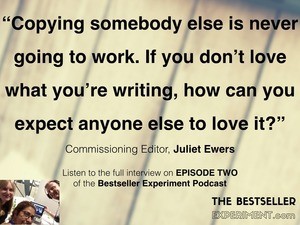
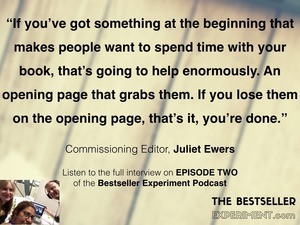
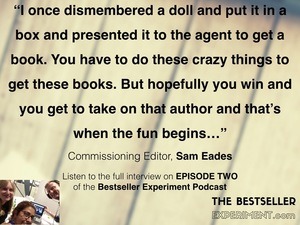
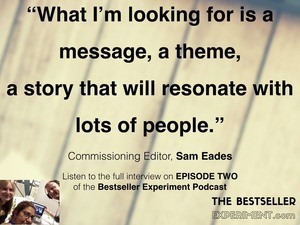
VIDEO TRAILER
SHARE THE PODCAST WITH A FRIEND
SUBSCRIBE TO THE BESTSELLER EXPERIMENT PODCAST!
